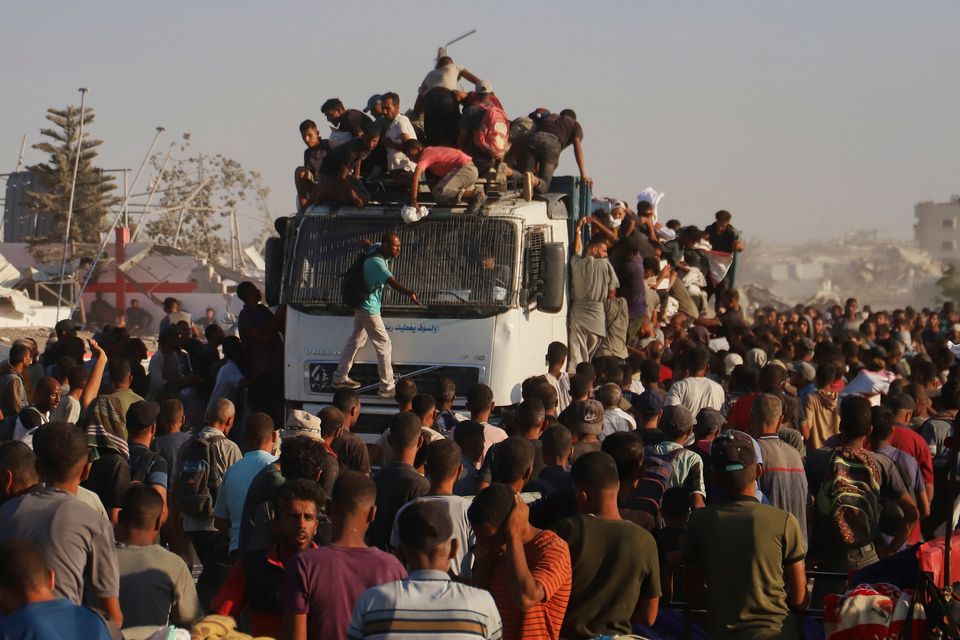World
Netanyahu Convenes Security Cabinet as Gaza War Escalates

Israeli Prime Minister Benjamin Netanyahu is set to convene his security cabinet this week to determine the country’s military strategy in Gaza. This meeting follows the collapse of indirect ceasefire talks with Hamas, during which insiders suggest that the cabinet may consider orders for increased military action. U.S. Middle East envoy Steve Witkoff visited Israel last week, indicating that he was collaborating with the Israeli government on a plan aimed at effectively concluding the conflict in Gaza.
The ceasefire negotiations, held in Doha, sought to establish a 60-day truce. This truce would allow for humanitarian aid to flow into Gaza while facilitating the release of half of the hostages held by Hamas in exchange for Palestinian prisoners in Israel. Despite these efforts, Israeli officials are now discussing the possibility of intensifying military operations and even annexing portions of Gaza, which has been significantly affected by the ongoing violence.
After meeting with Witkoff, a senior Israeli official mentioned that there was an emerging consensus between Washington and Israel regarding the need to transition from a temporary truce to a comprehensive agreement. This agreement would necessitate the release of all hostages, the disarmament of Hamas, and the demilitarization of the Gaza Strip, which are Israel’s core conditions for ending hostilities.
On Sunday, the sentiment shifted, with an Israeli official warning that pursuing a deal may be unproductive. The official stated, “An understanding is emerging that Hamas is not interested in a deal,” emphasizing Netanyahu’s push to prioritize the release of hostages while simultaneously aiming for a military defeat of Hamas. Reports from Israeli media suggest that Netanyahu is leaning towards expanding military operations and potentially seizing control of the entire Palestinian enclave.
Military Strategy Under Debate
The implications of a potential “military defeat” remain contentious within Israeli leadership circles. Some officials advocate for the formal annexation of parts of Gaza to leverage pressure on Hamas. Others, including Finance Minister Bezalel Smotrich and National Security Minister Itamar Ben-Gvir, recommend imposing military governance in Gaza before moving towards annexation and the re-establishment of Jewish settlements that were removed two decades ago.
The Israeli military is expected to present alternative strategies, including extending operations into areas of Gaza where they have not yet engaged. This comes amidst concerns from military leaders about the risks of further escalation, which could jeopardize the safety of the 20 hostages believed to still be alive. Eyal Zamir, the military chief, has expressed frustration regarding the perceived lack of strategic direction from political leaders, warning against a drawn-out conflict with Hamas.
A spokesperson for the Israel Defense Forces (IDF) has refrained from commenting on specific reports but stated that the military has various plans to counter terrorism. Lieutenant Colonel Nadav Shoshani remarked, “We have different ways to fight the terror organization, and that’s what the army does.”
International Reactions and Future Negotiations
On the diplomatic front, Qatar and Egypt have endorsed a declaration from France and Saudi Arabia that outlines steps toward a two-state solution to the Israeli-Palestinian conflict. This proposal calls for Hamas to relinquish its arms to the Western-backed Palestinian Authority. Despite these international efforts, Hamas has reiterated its refusal to disarm. Nevertheless, it has indicated a willingness to step back from governance in Gaza in favor of a non-partisan ruling body, as per insights from three Hamas officials.
Israel’s Foreign Minister Gideon Saar acknowledged the significant gaps in negotiations, stating, “We would like to have all our hostages back. We would like to see the end of this war. We always prefer to get there by diplomatic means, if possible. But of course, the big question is, what will be the conditions for the end of the war?”
As the situation continues to evolve, the international community watches closely, eager for a resolution that addresses both humanitarian concerns and the complex political landscape in the region.
-

 Top Stories3 months ago
Top Stories3 months agoTributes Surge for 9-Year-Old Leon Briody After Cancer Battle
-

 Entertainment4 months ago
Entertainment4 months agoAimee Osbourne Joins Family for Emotional Tribute to Ozzy
-

 Politics4 months ago
Politics4 months agoDanny Healy-Rae Considers Complaint After Altercation with Garda
-

 Top Stories4 months ago
Top Stories4 months agoIreland Enjoys Summer Heat as Hurricane Erin Approaches Atlantic
-

 World5 months ago
World5 months agoHawaii Commemorates 80 Years Since Hiroshima Bombing with Ceremony
-

 Top Stories3 months ago
Top Stories3 months agoNewcastle West Woman Patricia Foley Found Safe After Urgent Search
-

 Top Stories5 months ago
Top Stories5 months agoFianna Fáil TDs Urgently Consider Maire Geoghegan-Quinn for Presidency
-

 World5 months ago
World5 months agoCouple Convicted of Murdering Two-Year-Old Grandson in Wales
-

 World5 months ago
World5 months agoGaza Aid Distribution Tragedy: 20 Killed Amid Ongoing Violence
-

 World5 months ago
World5 months agoAristocrat Constance Marten and Partner Convicted of Infant Murder
-

 Top Stories4 months ago
Top Stories4 months agoClimbing Errigal: A Must-Do Summer Adventure in Donegal
-

 Top Stories4 months ago
Top Stories4 months agoHike Donegal’s Errigal Mountain NOW for Unforgettable Summer Views









